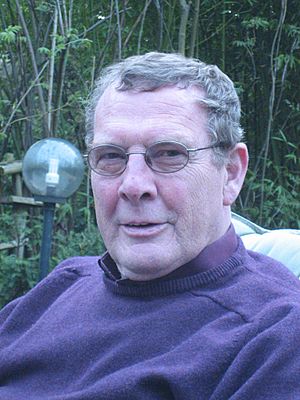Alexander Cools facts for kids
Quick facts for kids
Alexander Cools
|
|
|---|---|
 |
|
| Born | September 14?, 1941 |
| Died | September 7, 2013 (aged 71) Nijmegen, The Netherlands
|
| Nationality | Dutch |
| Alma mater | Radboud University Nijmegen |
| Known for | Research on dopamine and the basal ganglia |
| Awards | Distinguished Achievement Award (EBPS) |
| Scientific career | |
| Fields | Psychoneuropharmacology |
| Institutions | Radboud University Nijmegen |
| Thesis | The Caudate Nucleus and Neurochemical Control of Behaviour: The Function of Dopamine and Serotonin in the Caput Nuclei Caudati of Cats (1973) |
| Doctoral advisor | Jacques van Rossum, Jo Vossen |
| Influences | Jacques van Rossum, Adriaan Kortlandt |
Alexander Rudolf "Lex" Cools (born in The Hague, Netherlands, 1941 – died in Nijmegen, Netherlands, September 7, 2013) was a Dutch neuroscientist. He was very interested in how medicines affect behavior. This field is called pharmacology.
Life and Work
Alexander Cools earned his PhD degree in 1973. He studied at Radboud University Nijmegen. Later, he became a professor there in 1985. He taught at the university until he retired in 2006.
Important Discoveries
Cools was the first scientist to suggest something important in 1976. He thought there were different kinds of dopamine receptors. Dopamine is a chemical in your brain. Receptors are like tiny locks that chemicals fit into. At first, many people didn't believe him. But later, his idea was proven to be correct!
He also did a lot of work on the basal ganglia. This is a group of brain parts. They help control movement and learning.
Awards and Recognition
After he passed away, a science magazine called Behavioural Pharmacology honored him. They dedicated a special issue to his memory in 2014.
Cools helped start a group called the European Behavioural Pharmacology Society. He was also the second president of this society. In 2003, he received a special prize from them. It was called the Distinguished Achievement Award.
 | Delilah Pierce |
 | Gordon Parks |
 | Augusta Savage |
 | Charles Ethan Porter |

